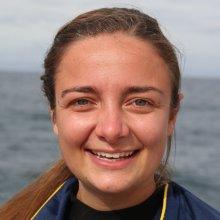
Aubrey Foulk
Tell us about your work/research. What kind of things do you do?
My primary research interest is in marine ecology, specifically in the context of changing climate. My undergraduate research explored the potential of a new proxy archive, bivalve Hiatella arctica, in recreating past oceanic climate conditions in order to make predictions about future environmental change. Post-graduation, I completed two field-based fisheries ecology internships in the Gulf of Mexico. I am currently completing my graduate degree in Marine and Environmental Sciences at Northeastern University with a focus on using ecological and climatic data to improve the ecological forecasting abilities of fisheries models.
What sparked your initial interest in your career?
I have always been unexplainably drawn to the ocean. My first oceanic discoveries were limited to what the waves brought to me. I was a relentless explorer: diligently sifting through the sand, scouring the beaches, and wading through the shallow waves. My first snorkeling set changed my viewpoint, opening the world under the waves. I now had the freedom to go after the discoveries I sought. Earning my scuba certification made the possibilities seem endless. I can't wait to explore the many mysteries the ocean holds in its depths.
Who influenced you or encouraged you the most?
My family always encouraged me from a young age to get outside and explore and appreciate the world around me. Throughout my academic career, my science teachers continued to nurture my curiosity and push me to ask questions about the observations I was making. Now, I am most inspired by the community of diverse scientists, both in discipline and background, that I hope I will someday be fortunate enough to call my colleagues.
What element of your work/study do you think is the most fascinating?
I find the most fascinating element of any scientific research to be the beauty of collaboration. Coming from the viewpoint of an aspiring marine ecologist, the complexity of marine ecosystems requires understanding their biological, geological, physical, and chemical properties in order to properly assess the entire oceanic environment. Collaboration amongst scientists with different backgrounds and specialties often paints the best picture of the question at hand.
What other jobs led you to your current career?
I have had numerous internships spanning a variety of environments and disciplines which have only strengthened my desire to pursue a career as a marine scientist.
What are your degrees and certifications?
Bachelor of Science in Biology and Environmental Science - Iowa State University 2017; Graduate degree in Marine and Environmental Sciences - Northeastern University (In Progress)
What are your hobbies?
As long as I'm outside, I'm happy. Consequently, I enjoy activities such as hiking, fishing, biking, and just hanging out by any decent-sized body of water.
What advice would you give to someone who wants to have a career like yours?
Develop a strong work ethic and find what you are passionate about. If you keep an open mind, you never know when an opportunity may present itself that could lead to the adventure of a lifetime.
How did you get involved with the Nautilus Exploration Program? How did you get on the ship?
My first experience on the Nautilus was as the ocean science intern. This will be my second expedition season returning as part of the science and data team.
Expeditions
Aubrey participated in the following Ocean Exploration Trust expeditions:
